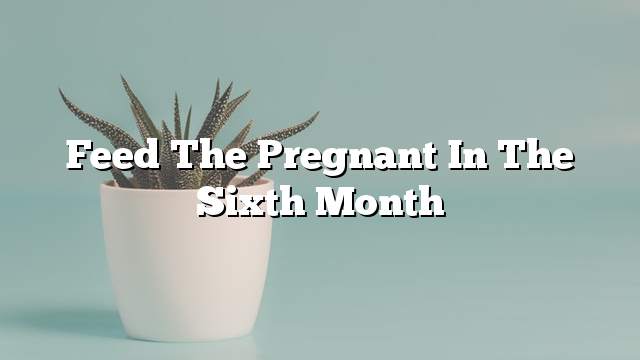Feeding pregnant women
Pregnant women undergo many physical and hormonal changes during pregnancy, and pregnant women need to borrow their diet more attention because their food will affect them and their child positively or negatively if their food is unbalanced, so they should follow a healthy diet rich in materials and micronutrients such as minerals and vitamins And other components, as well as food groups such as carbohydrates, fats and proteins.
The needs of pregnant women are increasing during pregnancy and it is common to consume excess food on the pretext of pregnancy. However, the fact is that the consumption of small amounts of food groups that provide calories and energy, such as carbohydrates, fats and proteins, increases. Such as vitamins and minerals because the body needs them in very small quantities, which are acquired if the pregnant woman followed a healthy diet and variety to promote the development of the child and its development.
To ensure that all necessary nutrients are consumed during pregnancy, pregnant women are advised to follow a balanced and varied diet as mentioned earlier, and to divide their meals during the day into three main meals. Each meal includes at least three food groups. Carbohydrates provide the body with the energy needed by the pregnant woman more than The usual, vegetables and fruits of all kinds provide the body with antioxidants, fiber, vitamins, soluble fats, meat, legumes, nuts and proteins generally provide the body with folic acid and iron, dairy products are the best source of Calcium and vitamin D. Finally, pregnant women are advised to drink at least eight glasses of water daily, and to take supplements such as iron and folic acid before pregnancy to ensure that the body has enough of these nutrients to ensure the health of mother and child.
Feed the pregnant in the sixth month
Pregnancy is divided into three stages. The sixth month is the last month of the second pregnancy. It is generally important during the second trimester to eat foods rich in calcium, magnesium and vitamin D, as nutrients that help the child to grow and form strong bones and teeth. Foods rich in omega-3 fatty acids and natural oils, which are one of the most important foods for the development and growth of the brain.
Pregnant women are advised to consume 300 calories more than their normal needs, and to ensure consumption of the recommended amounts of food groups and ingredients; the pregnant woman advises the pregnant women during the second and third pregnancies to take the following:
- Two pieces of protein.
- Nine or more whole grains.
- Seven or more servings of fruits and vegetables.
- Four or more servings of dairy products.
- Eat high-fat foods.
- Eat foods low in fat, sugars and sodium.
- Take supplements starting from birth until the end of pregnancy.
These are general guidelines that can be more determined by age, weight and height to plan a more accurate diet program.
Some foods are suggested for pregnant women in the sixth month
To ensure that pregnant women and their offspring receive the required nutrition, there are some foods and foods that are suggested to be addressed, including the following:
- Low-fat milk because it contains calcium, magnesium and vitamin D. It is also important in the second stage of pregnancy.
- Sunflower seeds and pumpkin seeds, which supply the body with calcium, iron and omega-3 fatty acids, can be taken alone or added to salads and soups.
- Dried fruits such as cotton, apricots and dates containing calcium and iron.
- Cheese sandwich with brown bread, because it contains the elements of calcium, magnesium and vitamin D in the second stage of pregnancy as mentioned previously and vitamin D, which helps to absorb calcium, and fiber helps to prevent constipation, which usually affects the pregnant during the second and third pregnancy.
- Potatoes and beans. The pregnant woman’s body supplies the iron that forms in the formation of red blood cells, fiber, and magnesium, which is important for bone growth and which helps the body convert food into energy.
- Vegetables of all kinds, especially containing magnesium and calcium, such as Cauliflower, green beans, cabbage, pamies and carrots, and advised to cook steam to maintain their nutrients.
- Canned sardine, because it contains edible soft bones, which provides pregnant women with calcium and omega-3 fatty acids and magnesium, and can be eaten with fiber-rich brown bread, or with pasta with the addition of cheese and nuts rich in magnesia and iron as pine.
- Chickpeas, because of its good content of calcium and iron.
- Dark chocolate, due to its potassium, magnesium, iron and some calcium.
- Rice and mushrooms, where the body supplies magnesium, fiber, calcium and vitamin D.
- Low-fat milk; rich in calcium.
Some foods are recommended for avoidance of pregnant women in the sixth month
There are a few foods recommend pregnant women to avoid consumption during pregnancy, including the following:
- Large fish such as swordfish and shark because they contain high amounts of mercury and replace them with relatively reduced fish such as salmon, catfish, shrimps and light canned tuna.
- Unpasteurized milk and its products.
- The soft cheeses are calvita and blue cheese because they contain bacteria that may cause infection.
- Coffee and stimulants in more than two cups a day.
- Alcohol, because it causes birth defects in the fetus and many other health complications.
